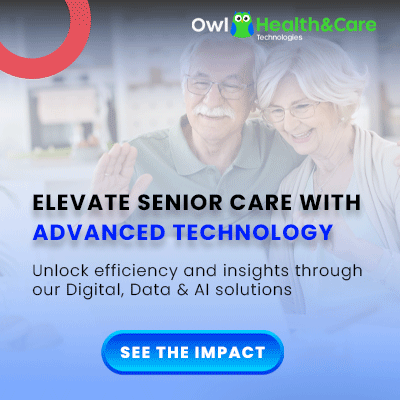By Pam McDonald
Rob Crowe, founder and CEO of Matchwell, reveals to Foresight Radio Producer Pam McDonald how his staffing software helps fill scheduling gaps. Major takeaways from the interview are noted below (lightly edited). Listen to the entire episode HERE.
I’m the founder and CEO of Matchwell, a software platform that helps put people to work. I’m an old staffing guy and spent two decades in healthcare. I decided there had to be a better way to connect healthcare clinicians looking for flex work, gig work, with employers’ scheduling gaps. And so, we built a technology platform to make that process very easy.
We’re not a staffing company; we’re actually the anti-staffing company, an alternative. There’s a $21 billion healthcare staffing industry out there trying to find healthcare clinicians who are not looking for full-time work. So, we focused on that flex work, whether it be for one shift, six weeks, 13 weeks, or even six months at a time.
It’s tapping into that workforce that’s not doing full-time work for one reason or another. And that’s part of what we want to do, is give senior living access to that 21 billion pool of clinicians. Only 2% of clinicians work through staffing companies; there’s 98% who don’t.
Matchwell Taps into the Freelance Workforce Not Going Through Agencies
The fastest-growing segment of every workforce is this flexible, freelance sector. When we look at healthcare, why should we be limited to only the 2% working through staffing companies? How do we start tapping into that 98% more effectively?
So, a big piece of what we do is give employers access to everybody they could get through an agency. But more importantly, we go out there and find those moms who are clinicians or caregivers. They’re trying to raise a family, run virtual school, and all the other challenges out there. A full-time job or a fixed schedule may not work for them. So, we make it really easy for them to know when you have scheduling gaps that they can step into.
Another demographic for us is the semi-retired; those later in their career. They’re looking to scale back. We can’t afford to lose them from the workforce. So, how do we engage them, give them more flexibility to keep them around a little longer?
You’re Missing Opportunities if You’re Not Talking about Flexibility
A lot of times there are people out there who have a full-time job, but they could pick up an extra shift or two. So, let’s build that pool and make it really easy for them to pick up a couple of shifts here and there.
And then finally, there’s this entire generation that’s entering the workforce right now . . . the millennials. But if you’re not talking about flexibility, if you’re not talking about engagement in a new way, you’re kind of missing the opportunity.
When you put all of these different groups together, it turns out there is a fairly large and growing workforce out there where flexibility matters. What we’re trying to do is give healthcare organizations easier access to them.
Robbing Peter to Pay Paul
It’s really hard to find people. Every organization out there knows that. We’re about half a million clinicians and caregivers short of what we need on any given day in America. That’s a big number. And if we just take one person out of Organization A and put them to work at Organization B, we’re just robbing Peter to pay Paul. We’re just moving the pain around. So that doesn’t actually help solve the problem.
Matchwell actually spends the biggest part of our time marketing, recruiting, and finding caregivers. We partner with state associations, all kinds of healthcare organizations, and schools. We’re partnering with Capella University and a couple of other schools to get access to both the clinicians coming through their program and also to their alumni network. A big piece of this is getting out there and letting clinicians know there’s a new way that they can actually provide great care, and it’s not always 40 hours a week.
Matchwell Also Gives Care Organizations Flexibility
In senior living, you have to be attached to a community. Everybody that we partner with has to be a W2 employee. We help make it easy to get all those credentials for that organization, to get through orientation, do assessments, and make sure that they meet the criteria. These organizations are the ones putting them to work. We’re just making it very easy to access them.
We do offer an employer-of-record option where we take care of all the taxes, burdens, giving them access to healthcare benefits. We’ve not found a cheaper way to access people and put them to work than what we’ve built. It gives healthcare organizations the flexibility of who do they want to be the employer? A lot of times our clients want them to be on our payroll until they can kind of vet them, make sure they’re a good fit for them.
Then they can convert them over to their payroll at any time or maybe it is just truly contract work. They just want to bring somebody in to fill 13 weeks while they try to find somebody full-time. And so, we can be that employer.
There’s A Lot of Strategic Advantages
With this gig pool, this on-demand pool, if we’re the employer of record, it can give you more flexibility because maybe you want to pay an extra dollar or two to incentivize people to pick up that last-minute work. And you don’t want to muddy the water with your full-time employees by paying more for some shifts versus others.
There are lots of strategic advantages for just having that option available. We consider ourselves employer agnostic, meaning if you want to just put everybody on your payroll, great. If you want us to be the employer of record, great. It’s really about treating your patients and getting the coverage, the rest of it are just options to make it worthwhile.
Making Matches Work
We find all these clinicians to come in but that doesn’t do us any good unless we have jobs where they can actually work. So, we partner with healthcare organizations and tap into their scheduling systems. Or we can upload systems to get those jobs so people can see them. Or you can actually enter the jobs directly into the platform. If you have a need on Saturday, you could just type in that Saturday shift. Leveraging technology just gives us a lot of ways to move quickly.
You post a job on Indeed or something, you might get 20 people interested, but only one’s qualified. So, you have to sort through the other 19. That takes time. Our platform just shows you the one that is qualified, so it makes it really easy for people to communicate.
In the platform, once that match has been made between caregivers and clinicians, the platform facilitates direct messaging. You can communicate directly with them. You’re not having to go to a staffing agency. Everything’s instant, everything’s direct. It’s kind of like an Uber where you’re communicating directly with your driver on the details.
Having a Healthy Workforce Is as Important as Providing Care
We called our software Matchwell because we realized that we’re in the matchmaking business. The “well” part, of course, was a tie into healthcare because it’s all about wellness. Having a healthy workforce is just as important as being able to treat your patients.
There’s no silver bullet to finding people; it’s hard. Then you’ve got retention issues. It’s this never-ending cycle. We bring more than a hundred years of healthcare staffing experience to our clients. We have teams of recruiters, teams for marketing. We are flooding social media; we’re doing all the job posting.
We’re syndicated across hundreds of job boards. We’re partnering with the associations and other channels for access to their networks. Because we’re not a staffing company, we don’t make money off of the hours that clinicians are working.
We can actually be in sync with what the associations want for their clinicians, as well as the organizations that are trying to treat their patients. Our mission, our goals are always aligned. We’re buying licensure lists and we are working those lists. We’re telephoning, emailing, you name it. We’re doing everything that needs to be done, the ABCs of recruiting.
Matchwell Gives Back to Healthcare Workers
We just kicked off a $50,000 dollar school loan paydown program. We realized we could put $50,000 into marketing recruiting activities, but what if we tried to change some lives in the process? What if we actually put some of that money into paying down school loans for some of these nurses?
When I look at 2020, the pandemic showed us what these clinicians are willing to do for us, for us as individuals, for us as a society. The fact that so many of these nurses are graduating with tens of thousands of dollars of school loans, it’s taking them decades to pay off, we decided let’s put some money into helping them. We kicked off this $50,000, but that’s just the first step. I hope to do many, many times that even this year. But we’ve got to start somewhere.
CNAs or other caregivers, if they had the money, they could go back to school and become a nurse. There are lots of things that money can do to kind of lift the tide. We’re just always looking for ways to give back and use our money to make the biggest personal impact possible.
The Scope of Clinicians Who Use Matchwell
When I say clinical that includes nursing, so RNs, LVNs, et cetera. We also do CNAs or caregivers, medical technicians, medical assistants, and therapists, your SLPs, OTs, PTs, the assistants, radiologists, anything that’s clinical is in scope for us.
Right now, we’re saying no to the nonclinical. We’re not doing environmental; we’re not doing food service. But it wouldn’t surprise me if in the future we might. One of the things I’m realizing is nonclinical does not mean non-critical. You need that staff too. You still need that coverage, and it fits with our mission to help the healthcare industry. And so, even though we’re not doing that today, it’s probably going to come in the future.
Not A Necessary Evil; But An Alternative
Our growth has been explosive. I think part of it is when you just do things for the right reasons, and you look for ways to give back whenever and wherever possible, great things happen. For 20 years of being in the staffing industry, I was called the necessary evil. “We didn’t want to use you. We have no choice.” We started Matchwell to give healthcare organizations and clinicians another choice.
I’ve been so proud and so pleased with how fast the industry is saying, “Where have you been?” We went from one state to 10 states in 2020, and we have a waitlist in many more states. We have the capital to expand nationally, and in two years, we will be in all 50 States. We are already supporting every clinical setting, from hospitals to skilled nursing, assisted living, home health, schools, community service centers, et cetera. And we will be in all geographies in the next 24 months.
Donating Vaccines for Every Match Made
I hope in two years we’re doing a million dollars a year in school loan giveaways. And we donate vaccines with every single match that our platform makes, just automatically. In two years, we’ll be north of giving away a million vaccines a year. We partner with an organization called Vaccine Ambassadors based in Durham, North Carolina, and they are partners with the World Health Organization. They work with very specific projects where vaccines are needed around the world.
We just finished a 25,000-vaccine campaign for Venezuela where there’s a migrant population moving out of the country and through Central America. They’ve been able to set up checkpoints and provide vaccines for that migrant population.
In America, we always talk with our clients about ROI, financial return on investment. “Hey, you’re going to pay Matchwell this, we’re going to return this kind of value for you.” But when I look at ROI, I can’t find a better return on investment than a couple of dollars to vaccinate a child for something that’s completely easy to eliminate. One in five children globally goes without basic vaccinations. We do give back with every single match and we will continue to do that.
A Living Wage and More
Technology has evolved the workplace; we are working all the time. Patient care never ends. It’s not just sitting in an office where people have that flexibility. Life is complicated and there are a lot of things pulling on each of us individually — our children, schooling, or aging parents. Flexibility matters.
We’re investing quite a bit into education. We have partnered with several schools in order to provide CEUs. We partnered with Capella recently for a leadership program. It’s something we’re really passionate about. We also provide assessments and training. even for CNAs, just to understand what the baseline competencies are, so we know where to invest to help them in their career.
The first part is making sure they’re a great clinician, that they provide great care. The second piece is how do we help them with their career? How do we make them more valuable? How do we help support them to earn more? And, nurses, therapists, make good money, but I think they’re still underpaid for the value they provide us as a society.
It pains me to know that they can go to Costco in a lot of cases and get paid more. But if they’re being called to work in healthcare and to provide patient care, we need to provide them that living wage. We need to give them the tools and the infrastructure to help them provide for their own families. And in return, retain them and give them a great career here in healthcare.
The Midwest-Northeast Corridor and Beyond
We launched in Georgia first, and then we expanded to Florida, South and North Carolina, Virginia, Maryland, D.C., Pennsylvania, Ohio, down through Kentucky, Tennessee, Alabama, stretching into Mississippi and Indiana. So, kind of Southeast and then reaching up into that Midwest-Northeast corridor, kind of a footprint currently.
The reason we’re in those states is that we have clients asking us to support their buildings in those states. We are partnering with quite a lot of larger regional organizations because they might be spending millions of dollars on agencies or overtime, or lots of shift differentials, premium pay to get workers to pick up those shifts. I’m very proud of the waitlist that we have, and we’re eager to jump into some more states because clients are asking. And so, we’re, coming, we’re coming.
We are not there to compete, we are there to empower and support, to provide that consultative experience and the entire infrastructure basically to allow these organizations to have their own internal agency. It’s almost like out of a box. We’ve got everything you need — the marketing, recruiting, tech, and engagement. Everything you need to do that and do it by yourself.
We don’t need agencies anymore; it’s 2021. I can’t even think of the last time I called a travel agency to book a family vacation. That’s what you’re doing every time you engage with an agency. And overtime’s not that much better. Overtime is almost as expensive and then you’re running the risk of burning out your employees. So, having an extended workforce that’s focused on flex really can be strategically deployed. That’s why we started Matchwell.
Not Necessary to be Tech-Savvy
Many of our users are not the most tech-savvy. Many of our users over the last 10 years have become much more adept. When I first got into health care, everything was pen and paper; they weren’t even using Excel. We’re constantly working to make our platform, our apps, as easy as possible. If you can call an Uber on your phone, you can use our platform.
We still are there to hold your hand. It’s very much a service approach. We have account managers and others to hold every one of our clients’ hands just to help move people through the process, to provide that day-to-day training. Because at the end of the day, we have to get these people to work. Over time, our users get very comfortable with the tech, but sometimes it takes a minute and that’s okay. You don’t have to learn it overnight.
The Matchwell Team Are Problem Solvers
Every use case is different for every organization, and this is certainly not a one-size-fits-all approach. It’s really rolling up our sleeves and understanding where’s the pain so we can find the right application of our approach and our platform. And that’s what we get to do every day.
My growing team here at Matchwell, are problem solvers. We get to roll up our sleeves, dig in, and help share what we’ve learned. What’s worked for other organizations, what have we seen that is maybe not the easiest thing to fix. We bring all that to the table and, at the end of the day, this is not a quick fix. This is about revolutionizing an industry and doing it together.
You can learn more about Matchwell by visiting their website.
Click here to read comments and join the conversation about this article.







